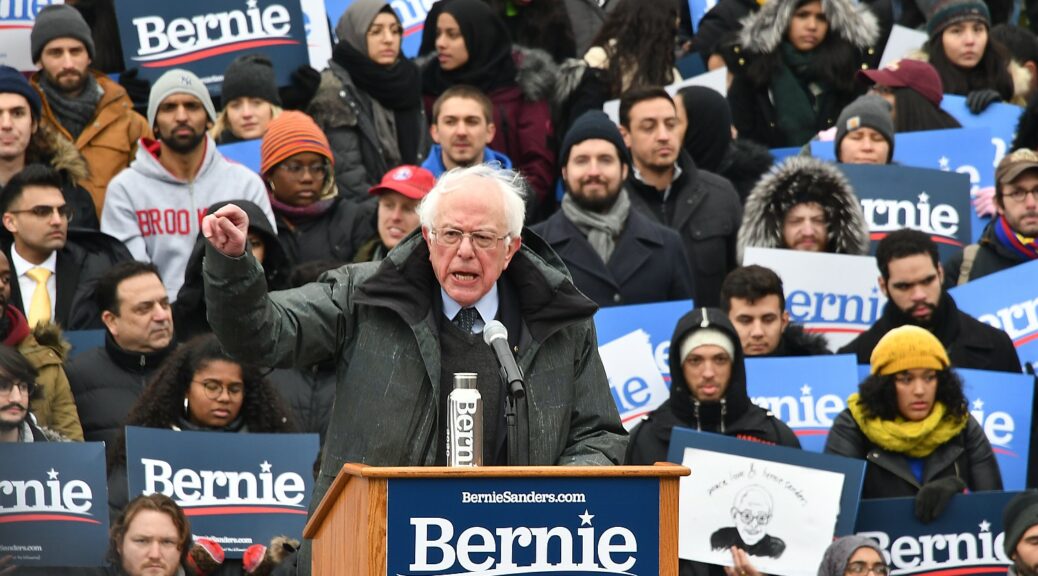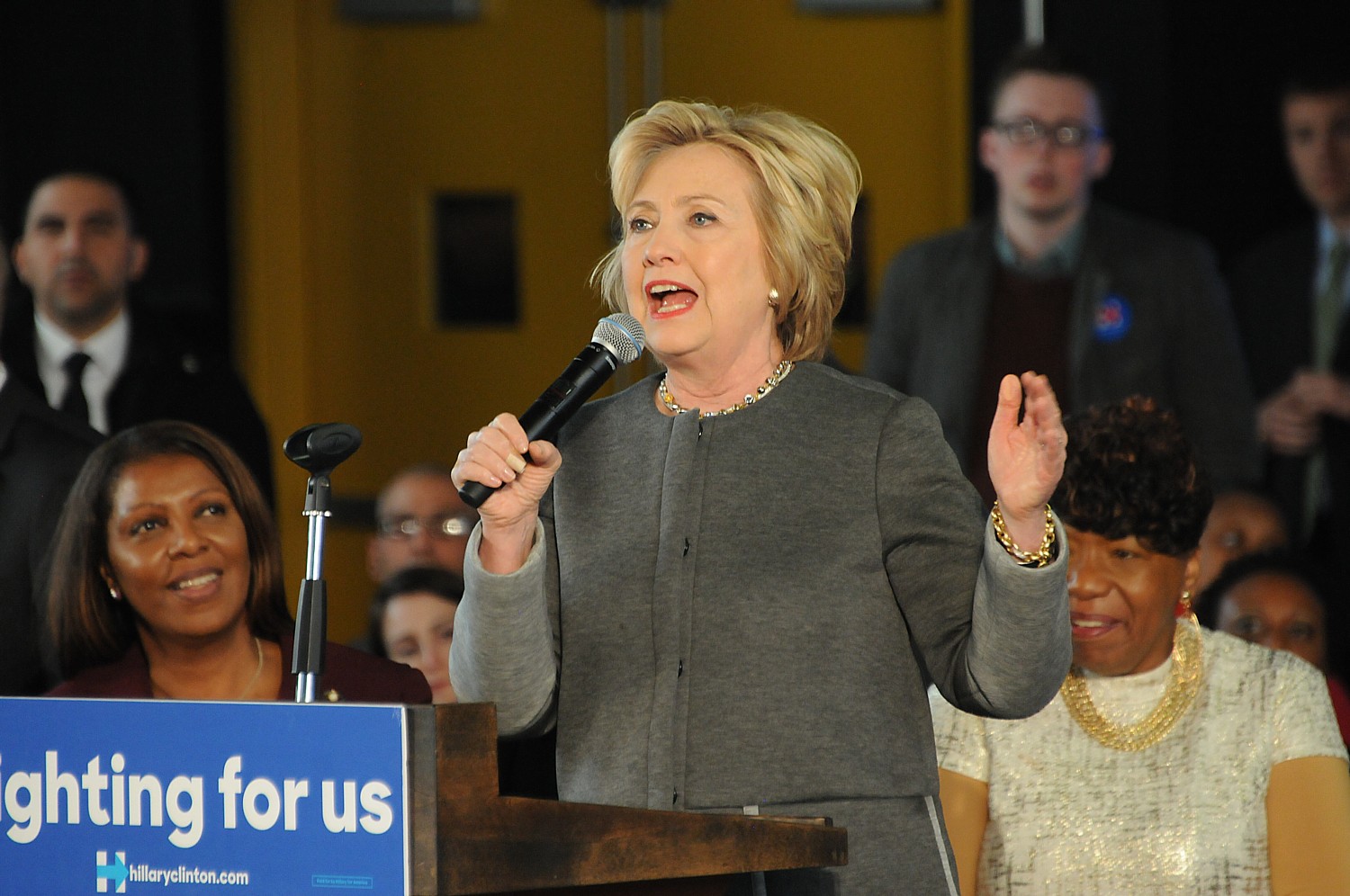
WASHINGTON – U.S. Senator Bernie Sanders, running to be the Democratic nominee for president, on July 17 delivered a major address on Medicare for All, coinciding with the 54th anniversary of Medicare being signed into law. In his remarks, Sanders outlined his plan to make health care a human right for all Americans. Here is highlighted transcript of remarks as they were prepared for delivery: – Karen Rubin, News & Photo Features
Thank you all very much for being here to discuss one of the major crises facing our country. Let me also thank the dozens of organizations throughout America who support Medicare for All and the tens of thousands of doctors, nurses and other health professionals who support my legislation. Let me thank the 14 Senate co-sponsors that we have on this legislation and the 118 Members of the House who support similar legislation. And mostly, let me thank the American people who by the millions understand, as I do, that health care is a human right, not a privilege.
Together, we will end the international embarrassment of the United States being the only major country on earth that does not guarantee health care to all of its citizens.
It is not acceptable to me, nor to the American people, that some 87 million people today are either uninsured or underinsured.
It is not acceptable to me that we end up spending almost twice as much as any other major country on health care, while our life expectancy continues to decline and our healthcare outcomes lag behind many other countries.
Frankly, I am sick and tired of talking to doctors who tell me about the patients who died because they were uninsured or underinsured, and walked into the doctor’s office when it was too late. And we are talking about over 30,000 Americans who die every year because they are uninsured or under-insured. What a tragedy.
I am sick and tired of seeing working class families and small businesses pay far more for healthcare than they can afford, and 530,000 Americans declare bankruptcy each year because they cannot pay off the outrageous cost of a medical emergency or a hospital stay. Families should not be driven into financial ruin because someone in the family became seriously ill. How insane is that?
I am sick and tired of hearing from Americans who lost loved ones because they could not afford the unbelievably high cost of prescription drugs, or hearing from constituents who are forced to cut their pills in half due to the cost.
In fact, later this month, I will be travelling from Detroit, Michigan to Windsor, Ontario with a busload of Americans who have diabetes in order to purchase insulin in Canada at one-tenth of the price that they pay in America.
I am sick and tired of talking with people who are struggling with mental illness but cannot afford the mental health counseling they desperately need.
I am tired of talking to people who have teeth that are rotting in their mouths, but cannot afford the high cost of dental care.
Let me be very honest and tell you that, in my view, the current debate over Medicare for All really has nothing to do with healthcare. It has everything to do with greed and the desire of the healthcare industry to maintain a system which fails the average American, but which makes the industry tens and tens of billions of dollars every year in profit.
It is about whether we maintain a dysfunctional system which allows the big drug and health insurance companies to make over $100 billion in profits last year, while the top CEOs in that industry made $2.6 billion in total compensation – all the while 1 out of 5 Americans cannot afford the prescription drugs their doctors prescribe.
It’s about whether we maintain a system in which the CEO of the Aetna insurance company, Mr. Mark Bertolini, received a golden parachute worth nearly $500 million after his company merged with CVS Health, while elderly people lack the resources to purchase a hearing aid.
It’s about whether we maintain a system that allows the former CEO from Gilead (John Martin) to become a billionaire by charging $1,000 a pill for a hepatitis c drug called Sovaldi that costs a dollar to manufacture.
Let us make no mistake about it. The struggle that we are now undertaking, to guarantee health care to all Americans as a right and to substantially lower the cost of prescription drugs, will be opposed by some of the most powerful forces in America – entities that have unlimited amounts of money. We’re talking about the insurance companies, the drug companies, private hospitals, medical equipment suppliers, Wall Street and other powerful entities.
Let me make a prediction. In order to defeat the Medicare for All movement, powerful special interests will be spending millions on 30 second television ads, full page magazine ads, and corporate-sponsored “studies” to frighten the American people about Medicare for All – which is exactly what happened before the passage of Medicare in the 1960s. They failed then and they’re going to fail now.
And let me give you an example of the kind of money and power we are talking about.
Over the last 20 years, the insurance industry and pharmaceutical companies have spent more than $330 million in campaign contributions and over $4 billion in lobbying to get Congress to do its bidding.
The pharmaceutical industry alone has hired some 1,200 lobbyists – including the former leadership of both political parties.
I find it quite interesting that Billy Tauzin, the Republican Congressman who wrote the bill to prevent Medicare from negotiating for lower drug prices and then went on to become the President and CEO of Pharma, received over $11.6 million in compensation in 2010.
That’s how business is done in Washington. Well, I have a different vision of what a rational healthcare system is all about. Instead of massive profits for the drug companies, the insurance companies and Wall Street, we must provide a healthcare system that provides quality healthcare to all in a cost effective way.
And that is exactly what Medicare for All does.
Under this legislation, every family in America would receive comprehensive coverage, and middle-class families would save thousands of dollars a year by eliminating their private insurance costs as we move to a publicly funded program.
The transition to the Medicare for All program would take place over four years. In the first year, benefits to older people would be expanded to include dental care, vision coverage and hearing aids, and the eligibility age for Medicare would be lowered to 55. All children under the age of 18 would also be covered. In the second year, the eligibility age would be lowered to 45 and in the third year to 35. By the fourth year, every man, woman and child in the country would be covered by Medicare for All.
Medicare for All will reduce – let me repeat, reduce — overall health care spending while lowering the number of uninsured and underinsured people in this country to zero.
We accomplish this because Medicare for All creates a system of health care insurance that isn’t designed to generate profits for insurance and drug companies — it will be a system focused on delivering actual health care. It will save lives, save money, and end the frustration of endless paperwork, denials, and desperate fights with an insurance company to cover medically-necessary medications and procedures.
Medicare for All will fully eliminate health insurance premiums, deductibles and co-payments. Make no mistake about it: These are nothing less than taxes on the middle class.
And when we do that, the average middle class family will save an estimated $3,000 each and every year.
Further, unlike the current dysfunctional system, Medicare for All allows people the freedom to choose any doctor, clinic, and hospital without worrying about whether their provider is in-network or not. People will be able to make the health care choices that are best for themselves and their families without some insurance bureaucrat telling them which providers they can see or not see. Medicare for All is at the end of the day empowering patients and health care providers.
In addition, a Medicare for All system will allow us to address the serious problem of medically underserved areas.
Just to demonstrate how absurd our health care system is, I was in Philadelphia two days ago rallying with the people of that city to try to stop the closure of Hahnemann University Hospital, an important, safety net hospital in that community. Why do the owners want to close this hospital? Because they can make more money redeveloping that property into condominiums and hotels.
Let me address some of the half-truths, misinformation, and, in some cases, outright lies that people may be hearing about Medicare for All.
Medicare for All critics tell us that Americans just love their private health insurance companies. We heard this most recently from UnitedHealth CEO David Wichmann, who by the way, made $83 million in 2017 and who said Medicare for All would “destabilize the nation’s health system.”
But let’s remember: the current system is already disrupting and destabilizing millions of people’s lives. In the current system, 50 million Americans every year lose their existing health insurance when their employer changes insurer, when they change jobs, or when they cannot afford their current plan. For many of them, they will no longer be able to see the doctor they have relied on for years. For others, important treatments for long-term conditions or disabilities will be changed or stopped altogether.
Here is the simple truth. The American people do not like their private health insurance companies. In fact private health insurance companies are quite unpopular. What the American people do like are their doctors, nurses and other health care providers.
While our opponents claim that Medicare for All is too expensive, the reality is that it is much more cost effective than our current system.
The Center for Medicare and Medicaid Services estimates that, if we do not change the system, this country will be spending $50 trillion over the next ten years –19.4 percent of our nation’s GDP. This is unsustainable and will be incredibly harmful to the people of our country, to the business community, and to the entire economy.
And the reason why we spend so much is obvious. It is not just the huge profits in the insurance industry and the pharmaceutical industry, but it is the incredible and wasteful bureaucratic maze developed by thousands of different healthcare plans. Today, hospitals and doctors must deal with patients who have different deductibles, different co-payments, different networks of coverage, and different coverage for pharmaceuticals, or no insurance at all. All of this is not only driving doctors and nurses and hospital administrators to distraction, but it is wasting up to $500 billion a year on unnecessary administrative costs.
Unlike our current system, there is broad consensus – from conservative to progressive economists – that Medicare for All would result in substantial savings to the American people. Two of the most recent studies on this issue have estimated that Medicare for All would save the American people between $2 trillion and $5 trillion over a 10-year period.
Let us be clear, the fight against Medicare for All today is not a new development. Powerful special interests have always opposed healthcare programs that work for the people and not for corporate interests.
Let us not forget that when President Harry Truman first proposed a program guaranteeing health care to seniors that idea was billed as radical, “un-American,” and an attack on basic freedom. And because of that assault, the idea stalled in Congress for years — until voters made their voices heard.
In 1960, America elected John F. Kennedy after he campaigned in support of Truman’s idea. That election prompted serious work on universal health care bill, and Kennedy at the time noted that “what we are now talking about doing, most of the countries of Europe did years ago.”
Finally, following the 1964 Democratic election landslide, the new Congress was able to pass what is now known as Medicare despite intense opposition from the health insurance industry and the pharmaceutical companies.
More than a half-century after that achievement, the time is now to go forward. The time is now to expand Medicare to every man, woman and child in this country.
Let us be very clear. When it comes to health care, the insurance and drug industries have been able to control the political process.
If we are going to break the stranglehold of corporate interests over the health care needs of the American people, we have got to confront a Washington culture that is corrupt, that puts profits before people.
That is why I am calling on every Democratic candidate in this election to join me in rejecting money from the insurance and drug industries. That means not accepting donations over $200 from health insurance or pharmaceutical company PACs, lobbyists or executives. Candidates who are not willing to take that pledge should explain to the American people why those corporate interests believe their campaigns are a good investment.
Of course, President Trump should do the same but I am not going to even waste my breath suggesting that he will. His efforts to throw 32 million people off their health insurance to have it replaced with junk insurance shows exactly what side he is on.
Finally, let me say, eliminating health insurance and drug company money from the Democratic primary won’t solve all the problems, but it is an important step forward. Now is the time to tell the health care industry that your profits are not more important than the lives of the American people.
See also: Biden Plan for Universal Healthcare: Protect, Build on Obamacare



